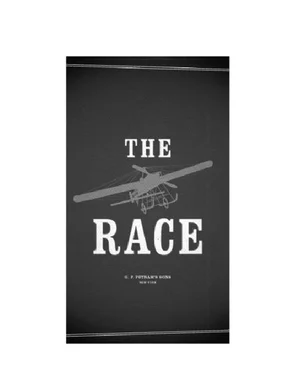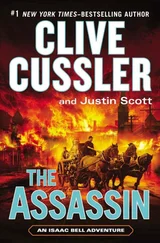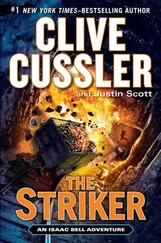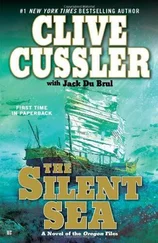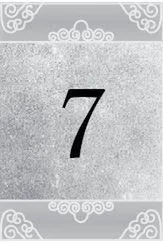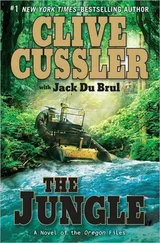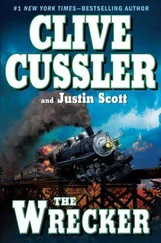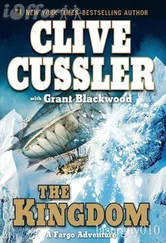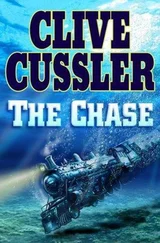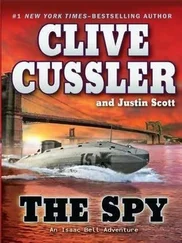Clive Cussler - The Race
Здесь есть возможность читать онлайн «Clive Cussler - The Race» весь текст электронной книги совершенно бесплатно (целиком полную версию без сокращений). В некоторых случаях можно слушать аудио, скачать через торрент в формате fb2 и присутствует краткое содержание. ISBN: , Жанр: Детектив, на английском языке. Описание произведения, (предисловие) а так же отзывы посетителей доступны на портале библиотеки ЛибКат.
- Название:The Race
- Автор:
- Жанр:
- Год:неизвестен
- ISBN:978-1-101-54773-1
- Рейтинг книги:3 / 5. Голосов: 1
-
Избранное:Добавить в избранное
- Отзывы:
-
Ваша оценка:
- 60
- 1
- 2
- 3
- 4
- 5
The Race: краткое содержание, описание и аннотация
Предлагаем к чтению аннотацию, описание, краткое содержание или предисловие (зависит от того, что написал сам автор книги «The Race»). Если вы не нашли необходимую информацию о книге — напишите в комментариях, мы постараемся отыскать её.
The Race — читать онлайн бесплатно полную книгу (весь текст) целиком
Ниже представлен текст книги, разбитый по страницам. Система сохранения места последней прочитанной страницы, позволяет с удобством читать онлайн бесплатно книгу «The Race», без необходимости каждый раз заново искать на чём Вы остановились. Поставьте закладку, и сможете в любой момент перейти на страницу, на которой закончили чтение.
Интервал:
Закладка:
“But it would be so good for aviation-” Celere pleaded.
“And even better for you. I wasn’t born yesterday.”
The telephone banged dead in Celere’s ear.
Celere listened outside the hotel dining room. He heard Bell speaking urgently. Then he heard Josephine say loudly and clearly, “No.”
Celere hurried out on the field to his monoplane. The fog was still heavy, and he could barely see Joe Mudd’s and Isaac Bell’s machines. Josephine’s Van Dorn mechanicians were watching him suspiciously even though he had been guiding their efforts since Yuma, Arizona.
“We should start the motor,” he said.
“Why? She’s not going anywhere.”
“Mr. Bell is very persuasive. He still may convince Josephine to change her mind. Let us fill her tanks, spin her motor, and make it warm for her.” They exchanged glances. Celere said, “I don’t see Joe’s Mudd’s mechanicians hanging about this morning. They’ll be ready to go when the fog lifts. Shouldn’t we be? Just in case?”
That got them going. It was after all a race, and though they were better detectives than mechanicians, they had been competing daily for forty-eight days and four thousand miles.
“Start fueling. I will be right back.”
He went to the tiny stateroom they had given him on the train and returned carrying a yard-long, six-inch-wide corrugated paper tube sealed at either end and shoved it into the driving nacelle.
“What’s that?” asked a detective.
“ San Francisco Inquirer flag, which Josephine is supposed to wave when she lands at the Presidio. What is wrong with motor?”
“What do you mean?”
“I do not like the sound.”
“Sounds fine to me.”
Celere looked the detective-mechanician in the eye. Then he flashed his most winning smile. “Let us make a deal, you and me, sir. I will not arrest criminals. You will not tell me that a flying-machine motor sounds like it will not suddenly stop in the sky.”
“Sorry, Celere. You’re right. What do you hear?”
“Bring me soapbox.” He climbed on the box and into the nacelle and played with the throttle, revving and slowing the Antoinette. He cocked his ear, shaking his head in puzzlement. “Pull chocks. Let’s taxi her around a little.”
“Careful you don’t run into anything. Can’t see fifty feet.”
The mechanicians pulled the wooden blocks that were holding the wheels in place.
Celere revved the motor. “You hear? You hear?”
“I’m not sure.”
“Listen. . Here, I make go faster.”
He opened the throttle all the way. The Antoinette’s crisp burble increased to a roar. He turned the rudder, shaped the wings, raced fifty yards along the grass, and soared into the fog.
BELL ORDERED his Eagle made ready to fly, but there was no following Celere in the fog because no one knew which way he had gone. He had to wait until some railroad dispatcher wired a report that he had been spotted. Nearly an hour later, Isaac Bell received a telephone call from the railroad detectives Tom Griggs and Ed Bottomley.
“Are you sure you got Harry Frost?”
“I laid him personally on a slab of ice in the Fresno police station.”
“Yeah, well, we just had our second dynamite robbery in two days. Fellow walked into our Merced shop with a coach gun, terrorized the poor old clerk into loading two hundred pounds of dynamite, detonators, and ice tongs on a track inspector’s handcar, and pumped off. We found the handcar three miles down the line next to an empty hayfield. Not a trace of the fellow or the dynamite or the ice tongs.”
“Ice tongs?” Bell echoed, mystified. “What else did he take?”
“Isn’t two hundred pounds of dynamite enough?”
“What else?”
“Hold on!. . Hey, Tom, Mr. Bell wants to know did he take anything else. . Oh yeah. Tom says he took a flashlight and some electric cable.”
“What kind of detonators? Fulminate of mercury?”
“Electric.”
“Did you find any truck or wagon tracks?”
“That’s the funny thing. The only wheel tracks were out in the middle of the field. Nothing by the road except footprints. Strange, don’t you think?”
“Not if he came and left on a flying machine!”
“Oh. Never thought of that. . You still there, Mr. Bell?”
Isaac Bell was running to his American Eagle . “Spin her over!”
The Gnome’s urgent Blat! Blat! Blat! caused Joe Mudd to turn aside and let Bell take off ahead of the Liberator. Bell picked up the Southern Pacific tracks and headed north toward San Francisco. He had less than two hundred miles in which to catch up with Marco Celere.
The stolen electric detonators, the flashlight, and the electric cable were the clues that told Bell exactly what Marco Celere intended to do. He had stolen the ingredients to make an aerial bomb with an electric detonator. Fulminate of mercury detonators that exploded on contact would be deadly on a flying machine that bounced as it took off from the ground and was battered sharply by air currents in the sky. Any sudden motion would make them detonate the dynamite and the flying machine with it.
But an electric detonator could be controlled by a simple switch between the flashlight batteries and the detonators. As long as the switch was off, the dynamite was safe. Switch it on, and the dynamite would explode.
Celere would have fashioned it to be moved into the on position after it was dropped – then only when it fell on its target. He would have installed two switches, one to make the bomb ready at the moment he was ready to drop, the second that would cause the explosion on impact.
Bell could not imagine why Celere had taken ice tongs.
But the rest was clear. Whiteway had refused to let him demonstrate that his machine could win the race, even without Josephine, leaving Celere with no way to prove to the Italian Army that his aeroplane could be a war machine.
Dropping two hundred pounds of dynamite would prove its military value with a bang heard around the world. As to what he would drop his bomb on, the answer was obvious. A con man like Celere was essentially the same as a boomer like Preston Whiteway. Both had an instinct for how to get the most publicity. Few buildings in San Francisco were as tall, and none more famous, than the San Francisco Inquirer Building. A flying machine destroying it would be a shot heard by every army general in the world.
And if Whiteway were to die in his penthouse office atop the San Francisco Inquirer Building, so much the better: the wealthy Widow Josephine would be available, Celere would think. Bell knew she would never fall for him again, but Celere didn’t. By the Italian’s reckoning, he would kill two birds with one bomb, Bell thought grimly: demonstrate the power of his warplane and marry a wealthy widow.
It was good flying weather. The wind had dropped. The sky was clear, the air cool enough to cool the motor and rich enough to make it run at top power. The Gnome rotary would give him the speed to overtake Celere. But when he finally saw the break in the hills that the rail line followed toward Oakland and then the blue bays of Oakland and San Francisco, he still had not caught up. Celere might have smashed along the way, in water or woods, where Bell hadn’t seen him. It was possible. The machines were tired.
Then, abruptly and with a sinking heart, Isaac Bell saw the yellow speck that told him Celere was crossing the bay and closing in on the city. He was flying lower than Bell, perhaps dragged down by the weight of the explosives or perhaps descending to make it easier to hit his target. But it gave Bell a slim advantage, and he took it, pushing his control post forward and diving to increase speed.
Читать дальшеИнтервал:
Закладка:
Похожие книги на «The Race»
Представляем Вашему вниманию похожие книги на «The Race» списком для выбора. Мы отобрали схожую по названию и смыслу литературу в надежде предоставить читателям больше вариантов отыскать новые, интересные, ещё непрочитанные произведения.
Обсуждение, отзывы о книге «The Race» и просто собственные мнения читателей. Оставьте ваши комментарии, напишите, что Вы думаете о произведении, его смысле или главных героях. Укажите что конкретно понравилось, а что нет, и почему Вы так считаете.
